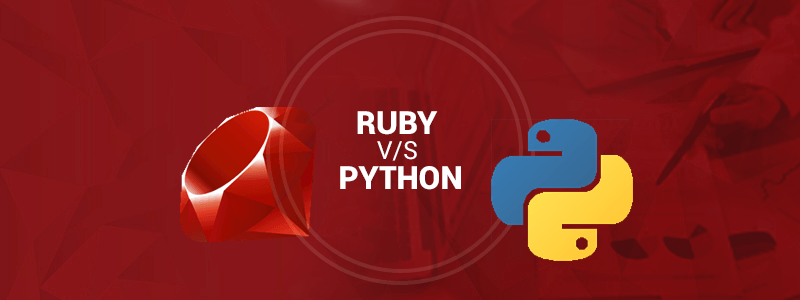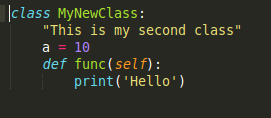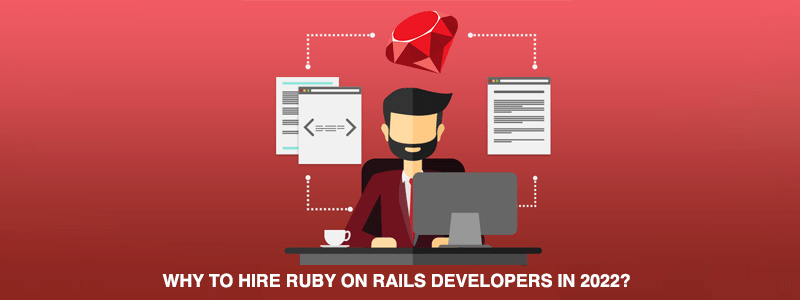Ruby y Python, ambos son rápidos y poderosos. Ambos lenguajes son muy apreciados en las comunidades de programación. ¡Lo que los diferencia, lo que hace que un desarrollador elija uno sobre el otro, será nuestro tema del día!
¡Hablemos primero de las similitudes!
Ruby y Python son lenguajes de programación del lado del servidor y se centran en sencillez, trabajando hacia desarrollo rápido es decir ¡Hacer las cosas a un ritmo más rápido mientras escribe la menor cantidad de código posible! These scripts abstain from verbose code, strict hierarchy patterns, and syntax correctness for focussing more on the Object Oriented behaviour. Sounds intriguing, doesn’t it??!
Both are in high demands among the start-ups focused on developing web apps as these are the developer-friendly scripts, giving you the desired results in fewer coding efforts. Both these languages are interpreted languages which implies that there’s no need to use a compiler, unlike C++ or Scala.
Ahora, las diferencias
Ruby y el marco Ruby on Rails
Introducido en 1995, Ruby tiene sus raíces profundas en Conceptos orientados a objetos, majorly influenced by C++, Perl and Java. Ruby is an ideal choice for collaboration, speed and business where you can act as fast as you think!
It’s preferably used from Web Development to get the complex, high traffic sites and apps up and running in no time. One of the main principles that Ruby stands on, is "Haz más con menos", dando a los desarrolladores su Libertad y Flexibilidad, by letting them code in the style they find comfortable, with the same optimal results.
Ruby when combined with Rails gives a developer a superpower, called as Gemas. These are external libraries, that come bundled with functionalities that most of the websites seek, like Login/Registration (done via Devise Gem), thereby saving a Developers’ time, and letting them focus more on the functionalities that need their expertise.
Now let’s talk about some of the popular websites built using Ruby,
- Campamento base (¡me escucharon bien, carmatecianos!)
- Twitter (concebido, usando Ruby)
- GitHub (¡Hurra, el desarrollador que hay en mí!)
- Airbnb
Al ser Rubyist, la razón por la que amo Ruby es su simplicidad. Me da el espacio para codificar de la manera que yo elija, brindándome una amplia variedad de opciones para elegir. En resumen, es amigable para los desarrolladores, fácil de aprender y divertido de aprender.
Python y el marco Django
Python se trata de Eficiencia y Apoyo for applications that require heavy calculations, which are the basic needs for any application that has to do with Data and Science. When coupled with Django, Python enables super-fast development.
Python is usually preferred for academic and scientific programming, it has a huge collection of libraries to work with, which makes it the best for the websites that are high on data-usage and where dealing with high-traffic is a major concern. It works well for websites with a lot of Math, big data and calculations. It is actively used by Data Scientists for prototyping and data analysis. The working principle in Python is “Una forma correcta de hacer las cosas”.
Python offers you ample of code readability and speed to work with and it is easy to learn, a bit conservative, stricter than Ruby and efficient – all at the same time! The developers usually love Python for its stable nature and fewer needs for updates – thereby being consistent, wherein you don’t constantly have to worry about deprecations and warnings.
Some major apps built on Python, are:
- YouTube
- Spotify
- BitTorrent
It makes sense to conclude with the fact that Ruby and Python are both fast and effective and both have their own followers. It all boils down to how you want to model your Website or Application.
If your app is going to need a lot of processing logic, dealing with large amounts of data, Python will be your best bet. On the other hand, if you want fast results, which deal elegantly with heavy-traffic, Ruby is your God.
I hope this article helped you learn something new!
¡Mantente sintonizado para más!
Signing off,







